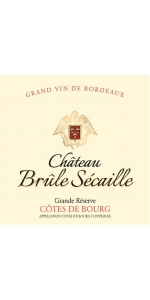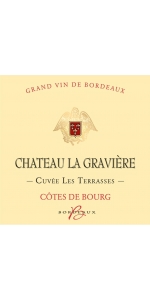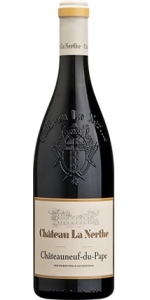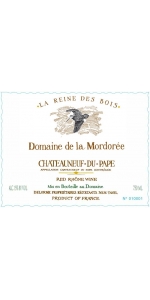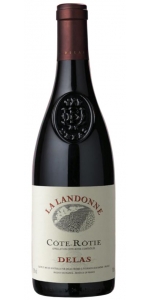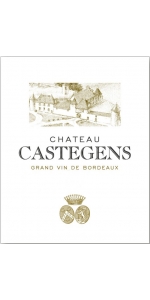Chateau La Graviere Les Terrasses Cotes de Bourg Rouge 2019
6 bottles with free shipping for: $132.00
12 bottles with free shipping for: $240.00
| BUY MORE! SAVE MORE! | ||||||||||||||||||||
|
| Country: | France |
| Region: | Bordeaux |
| Winery: | Vignobles Rodet Recapet |
| Grape Type: | Merlot |
| Vintage: | 2019 |
| Bottle Size: | 750 ml |
Graviere La Rouge Cuvee les Terrasses is made of 70% Merlot and 30% Cabernet Sauvignon
Deep red color with a narrow purple rim. Attractive aromas of ripe, juicy cherry and blackberry over spice, integrated toasted aromas. The palate is balanced and full-bodied with supple tannins, displaying rich cherry flavors combined with gentle toasting characters and a touch of spice. The finish is lasting with a bitter almond aftertaste.
Average age of the vines is 25 years.
Manual harvest from September 21th to October 7th 2015.
Upon arrival at the winery, only the best grapes were selected using a sorting table.
Skin contact maceration during 2 weeks in temperature controlled vats.
75% of the final wine was aged in stainless steel tanks with French oak staves and blended with 25% of wine aged in barrels.
Serve with red, white meats, poultry and fine cheeses.
Vignobles Rodet Recapet Estate Vignobles Rodet is owner of Château Brulesecaille and Château La Gravière in the Cotes de Bourg AOC. Jacques is a viticulture engineer (graduated from Bordeaux Science Agro) specialized in Nature Protection and focuses viticulture. Guillaume (graduated from DUAD Bordeaux) oversees vinification operations in the cellar. Jacques believes in using more natural methods to encourage ripening; he utilizes canopy mangement techniques, removes leaves and thins bunches as necessary. In September 2016 the estate received High Environnemental Value level 3 Certification. This covers mainly four key areas : biodiversity conservation, plant protection strategy, optimized management of fertilization and water management.
Date Founded: 1840 Owner: Martine and Jacques RODET Winery Philosophy: Making great wines, using both modern winemaking and traditional viticulture. In 1924, The RÉCAPET family bought Château BRULESÉCAILLE. In 1974, the estate was handed down from M. Pierre RÉCAPET to his daughter and son in law, Martine and Jacques RODET. It is now included in a structure named G.F.A. RODET RECAPET. Winery Acreage: 74 acres (30 hectares) Winery Production: 12,000 / 9L cases Varietals Produced: 54% Merlot 25% Cabernet Sauvignon 9% Cabernet Franc 4.5% Malbec 7.5% Sauvignon Blanc and Gris Winemaker: Jacques RODET (graduate agricultural engineer) and his son Guillaume. Located in the heart of the Côtes de Bourg region, BrûleSécaille is a 28 hectare vineyard classed "Cru Bourgeois" since 1868.
The name ‘Brulesécaille’ derives from Gascon; “Bruler” means “to burn” and “sécaille” is from the latin “secare” meaning “to cut”. According to tradition, we burn the cut vine branches during pruning. Brulesécaille is situated on a clay limestone outcrop. This particular soil composition dominates the Dordogne valley and allows excellent drainage in winter and spring. The vines enjoy excellent sun exposure, encouraging consistent ripening vintage after vintage.
Because the vineyard survived the particularly hard winter frosts of 1945, 1956 and 1991, there are some significant older vines, up to seventy-five years old. Château BruleSécaille : 23 ha Château La Gravière : 5 ha Château YON St Christophe : 2 ha Every care is taken by Jacques RODET (graduate agricultural engineer) to respect nature, maintaining a biological balance from growth to harvesting in particular by thinning out leaves and excess grapes in order to produce a natural wine. The grapes are picked by hand. Great care is taken with the manual picking over, de-stemming and crushing. The wine needs a long fermentation and maceration period (3 to 5 weeks) in stainless steel tanks, controlled by an automatic temperature monitoring system, to ensure a rich full-bodied wine.
Chateau Brule Secaille Grande Reserve Cotes de Bourg Rouge is made from 55% Merlot, 30% Cabernet sauvignon, 10% Cabernet Franc and 5% Malbec.
The color is deep dark ruby. limpid and brilliant. The nose is intense and complex with hints of blackberries, sweet spicies, noble plain chocolate and Vanilla. The palate is full bodied, very long with well integrated tannins. The finish is very fresh and luscious with toasted notes in the background.
Average age of the vines is 30 years.
Manual harvest from September 21th to October 7th 2015.
Upon arrival at the winery, only the best grapes were selected using a sorting table.
Skin contact maceration during 2 weeks in temperature controlled vats.
Aged 12 months in Oak barrels. (1/3 new oak, 1/3 1 year old and 1/3 two year old barrels). They use 60% French Oak and 40% American Oak.
Served with red meat (beef filet, sirloin), pork tenderloin, roasted duck breast with honey&orange sauce, roasted lamb with thyme, poultry and fine cheese.
Review:
"A purple-colored, young wine dominated by Merlot, this is rich, structured and full of blackberries. With a good balance between the fruit and the tannins already in place, it shows excellent potential. Drink this already delicious but still firm wine from 2022. - ROGER VOSS"
- Wine Enthusiast (December 2018, Best of Year 2018 Issue), 90 pts
Graviere La Rouge Cuvee les Terrasses is made of 70% Merlot and 30% Cabernet Sauvignon
Deep red color with a narrow purple rim. Attractive aromas of ripe, juicy cherry and blackberry over spice, integrated toasted aromas. The palate is balanced and full-bodied with supple tannins, displaying rich cherry flavors combined with gentle toasting characters and a touch of spice. The finish is lasting with a bitter almond aftertaste.
Average age of the vines is 25 years.
Upon arrival at the winery, only the best grapes were selected using a sorting table.
Skin contact maceration during 2 weeks in temperature controlled vats.
75% of the final wine was aged in stainless steel tanks with French oak staves and blended with 25% of wine aged in barrels.
Serve with red, white meats, poultry and fine cheeses.
Chateau La Nerthe Chateauneuf-du-Pape Rouge is made from Grenache 39%, Mourvédre 33%, Syrah 25%, Cinsault 2%, Others 1%.
Château La Nerthe is one of the oldest estates in Châteauneuf-du-Pape and dates from 1560. Château La Nerthe has 227 acres of vineyards that surround the château and top the renowned La Crau plateau. The terroir is typical of the region. Vineyards run along a slope and grow in sandy-clay soils. The ground is covered by a layer of ‘galets’ – large, round, well-worn stones that were carried down from the Alps by glaciers during the last ice age. All the 13 permitted primary varietals are planted here. Grenache dominates 62% of the vineyards and the average vine age is over 40 years old. The grapes are hand harvested and sorted on tables. The grapes are then put into vats for almost 4 weeks with regular pump overs and punch downs. The must is tasted every day during fermentation to ensure the best extraction of the berry compounds. At the end, the wines are racked into oak vats for malolactic fermentation. The cuvée is then aged in large French oak casks and barrels for 12 months before blending. Bottling takes place 6 months later.
The dark, deep, inky color of the wine shows immediately, stemming from the concentration of the vintage. Nose of blackcurrants, black tea and dried flowers stands out. The mouth is rich, fruity and velvety with an incredibly layered tannic structure. The wine is balanced and pure with strong intense and incredibly long aging potential.
- One of the oldest estates in Châteauneuf-du-Pape - dates from 1560
- Estate grown, hand harvested, estate bottled
- Average vine age is 40+ years
- Certified AB Organic
Review:
A focused expression, this wine delivers pure red and black fruits unfolding against a delicate rose-petal backdrop. Silky yet chewy tannins gradually reveal layers of red cherry, pomegranate, spice, violets, and a hint of clove. Its elegance is underscored by fine tannins, suggesting a wine that, while quiet now, holds the promise of revealing its full beauty with time in the bottle. Cellaring through 2028+ before revisiting should prove to be rewarding.
-Wine Enthusiast 93 Points
Mordoree Chateauneuf-du-Pape La Reine des Bois is made from Grenache 75 %, Mourvèdre 10%, Syrah 10 % , Counoise 3% & Vaccarese 2%.
This premium cuvee - whose name means "Queen of the Woods" - is from 65-year-old vines, planted on Villafranchian-era terrasses. Yield is 30 hl/ha.
Deep ruby red; opaque. Aromas of red fruits change to wooden touches of leather, black truffles and coffee. Fat, concentrated and full flavored with a very long liquoriced and fruity finish.
Pairs with red meats, sauce dishes, game animals (woodcock, wild boar) and semi mature cheeses.
Review:
"The 2019 Châteauneuf Du Pape Cuvée De La Reine des Bois is a deeper, more masculine wine with gorgeous cassis and blackberry fruits as well as graphite, licorice, crushed stone, violets, and lavender nuances. Rich, full-bodied, and incredibly concentrated, it has a brilliant sense of freshness and purity as well as length on the finish. It's going to require 4-5 years of bottle age, but this straight-up thrilling Châteauneuf du Pape will have 20-25 years of prime drinking."
- Jeb Dunnuck (November 2021), 98+ pts
Delas Freres Cote Rotie La Landonne Rouge is made from 100 percent Syrah.
This very ancient region dates back to the Roman Era and is located on the right bank of the Rhône. It is said that during the Middle Ages, “The Seigneur de Maugiron” gave a hillside to each of his two daughters - one was brunette and the other fair - thus, were born the names of “Côte Brune” and “Côte Blonde.” Wines from the Côte Blonde tend to be more delicate and lighter in character than the fuller wines of the Côte Brune. Together, they make a wine of style and substance. This cuvée is a vineyard plot selection. The grapes come exclusively from a plot within the named slope of “La Landonne.”
This cuvée‘s first vintage was 1997. The wine is only made in the very best years. Its highly limited production never exceeds 2,500 bottles per year.
The steep, terraced hillsides along the river produce wines that are among the "biggest" reds of France. The Delas Côte-Rôtie is primarily Syrah with an addition of up to 10 to 20% of Viognier grapes in the crop. The soils of the northern part of the Côte Brune vineyard consists of extremely steep, terraced slopes of ferruginous mica schists which are covered with schist sand (arzel). The Côte Blonde has a varied geology with gneiss and granite predominating at the most southern side of the appellation. The area has dry, hot summers with regular rainfalls during other seasons. The grapes for the “La Landonne” cuvée are picked by hand at maximum maturity. Fermentation takes place in traditional open-topped concrete tanks, following three days of pre-fermentation cold maceration. Before fermentation, the maceration process continues under controlled temperatures of 82°F to 86°F. Daily cap pushing down and pumping over are carried out for about 10 days with total vatting time of up to 20 days. The wine is aged for 14 to 16 months in new or one year old oak casks. The barrels are topped up regularly.
Food Pairing: This wine pairs wonderfully with fine meats, roasted beef, water games, truffles and spicy stews. The bottle should be opened 1 to 3 hours before drinking. This wine needs at least 3 years cellaring before it can open up its complexity. In such case it is strongly recommended to decant before serving.
Tasting Notes: The wine‘s deep color is underscored by plummy hues. A complex nose shows deep, fruity aromas with hints of licorice and roasted coffee. Endowed with a dense and silky tannic structure, this is a full, fleshy wine that provides an ample and generous palate. Its lasting finish speaks of considerable ageing potential.
Reviews:
This is dark and still a bit reticent, with a cast iron cloak around the core of dark currant, plum and blackberry paste flavors, showing lots of sweet bay leaf, anise and singed apple wood notes in the background. There's serious grip through the finish. For the cellar.
-Wine Spectator 96 Points
Very open, spicy and fresh on the nose, you could almost open this now. Struck flint notes assist in teasing out notes of leaf tea, tobacco, rosemary and rose. Very full-bodied, generous but powerful on the palate, tense and mineral. Mouthcoating ripe, sweet tannin and robust amounts of sweet baking spices, along with more tobacco and black fruit on the palate. Has depth, length, power and impressive balance despite the high alcohol. Drink from now into 2022, or from 2031 to 2040. Lieu-dit La Landonne, from the Brune side (mica schist bedrock). Matured in new and one-year-old barrels for 14 months.
-Decanter 96 Points
The 2019 Côte Rôtie La Landonne comes from one of the greatest sites for Syrah in the world, the La Landonne lieu-dit located close to the center of the appellation, on the Côte Brune side. It reveals a deeper purple hue (it's slightly more opaque than the Seigneur de Maugiron) and offers a brilliant nose of ripe cassis, black raspberries, scorched earth, smoked herbs, and seared meat. Full-bodied and powerful on the palate, this is a deep, spicy, concentrated Côte Rôtie with a plush, layered mouthfeel, sweet tannins, beautiful balance, and a great, great finish. This puppy brings the fruit, opulence, and texture of the vintage yet still has a classic Côte Rôtie character.
-Jeb Dunnuck 96 Points
Fresh aromatic layers of mint sit atop crushed red cherries and wild strawberries, with light clove and thyme on the nose. The palate is rich and enticing with black cherries, plums, rhubarb, pomegranate seeds, black olives and freshly picked rosemary leaves. Tremendous texture, structure, and refreshing acidity carry this wine to a robust finish of orange zest and black tea leaves. Maisons Marques & Domaines USA.
- Wine Enthusiast 96 Points
Overview
This very ancient region dates back to the Roman Era and is located on the right bank of the Rhône. It is said that during the Middle Ages, “The Seigneur de Maugiron” gave a hillside to each of his two daughters - one was brunette and the other fair - thus, were born the names of “Côte Brune” and “Côte Blonde.” Wines from the Côte Blonde tend to be more delicate and lighter in character than the fuller wines of the Côte Brune. Together, they make a wine of style and substance. This cuvée is a vineyard plot selection. The grapes come exclusively from a plot within the named slope of “La Landonne.”
This cuvée‘s first vintage was 1997. The wine is only made in the very best years. Its highly limited production never exceeds 2,500 bottles per year.
Winemaking
The steep, terraced hillsides along the river produce wines that are among the "biggest" reds of France. The Delas Côte-Rôtie is primarily Syrah with an addition of up to 10 to 20% of Viognier grapes in the crop. The soils of the northern part of the Côte Brune vineyard consists of extremely steep, terraced slopes of ferruginous mica schists which are covered with schist sand (arzel). The Côte Blonde has a varied geology with gneiss and granite predominating at the most southern side of the appellation. The area has dry, hot summers with regular rainfalls during other seasons. The grapes for the “La Landonne” cuvée are picked by hand at maximum maturity. Fermentation takes place in traditional open-topped concrete tanks, following three days of pre-fermentation cold maceration. Before fermentation, the maceration process continues under controlled temperatures of 82°F to 86°F. Daily cap pushing down and pumping over are carried out for about 10 days with total vatting time of up to 20 days. The wine is aged for 14 to 16 months in new or one year old oak casks. The barrels are topped up regularly.
Tasting Notes
The wine‘s deep color is underscored by plummy hues. A complex nose shows deep, fruity aromas with hints of licorice and roasted coffee. Endowed with a dense and silky tannic structure, this is a full, fleshy wine that provides an ample and generous palate. Its lasting finish speaks of considerable ageing potential.
Food Pairing
This wine pairs wonderfully with fine meats, roasted beef, water games, truffles and spicy stews. The bottle should be opened 1 to 3 hours before drinking. This wine needs at least 3 years cellaring before it can open up its complexity. In such case it is strongly recommended to decant before serving.
Chateau Castegens Cotes de Bordeaux Castillon is made from 80% Merlot, 18% Cabernet Franc and 2% Cabernet Sauvignon.
The wine boasts an intense, deep and lively red color. The nose offers black fruit, blackberry, cigar box, licorice, some delicate and integrated oak flavors as well. The mouth is full of fruit flavors, spice and fine toasty flavors. The structure is rich, but the tannins are well integrated already. The finish is long and a slight mintiness give the wine a great length and some purity.
Pairs great with meat and vegetables on the grill.
- back
Domaine Chavy Chouet Meursault Les Narvaux is made from 100% Chardonnay from extremely steep vineyards.
Les Narvaux in Meursault sits at the top of the slope on a steep, shallow, limestone plot.
TW Tasting notes: A lively and balanced wine with aromas of white-fleshed fruit. It offers hints of toasted almond on the nose and is very long on the palate. Mineral and energetic, it will only open up fully after a few years in the cellar. In the top 5 of my top Meursault picks.
60 Year old vine
Ageing: 12 months in French oak barrels (20% new)Planting density: 10000
Surface area: 0.5Ha
Michel Thomas Sancerre Blanc is 100% Sauvignon Blanc (40% Caillottes, 40% Grosses Terres, 20% Silex)
The wine displays an exotic nose with a touch of smoke and licorice. On the palate, peach and watermelon dominate with citrus zest and chalk notes.
Aged on the lees for a few months (no oak). It goes well with seafood, fish, goats cheese.



